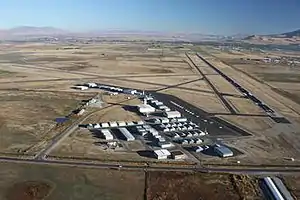Logan-Cache Airport
Logan-Cache Airport (IATA: LGU, ICAO: KLGU, FAA LID: LGU) is three miles northwest of Logan in Cache County, Utah. It is owned under the Logan-Cache Airport Authority formed by Inter-local Agreement between Cache County and Logan City in 1992. The airport was previously owned by Cache County and managed by county commissioners. This organization is subsidized by the city and county, having no authority to tax or bond for additional funding. Revenues are derived from leases of land, buildings, fuel and maintenance fees.
Logan-Cache Airport | |||||||||||||||
|---|---|---|---|---|---|---|---|---|---|---|---|---|---|---|---|
 | |||||||||||||||
| Summary | |||||||||||||||
| Airport type | Public | ||||||||||||||
| Owner | Management and Airport Authority of Logan City | ||||||||||||||
| Operator | Utah State University | ||||||||||||||
| Serves | Northern Utah and Southern Idaho | ||||||||||||||
| Location | North Logan, Utah | ||||||||||||||
| Focus city for |
| ||||||||||||||
| Elevation AMSL | 4,457 ft / 1,358.5 m | ||||||||||||||
| Coordinates | 41°47′28.4″N 111°51′05.7″W | ||||||||||||||
| Website | https://www.logan-cacheairport.org/visiting-logan-utah/ | ||||||||||||||
| Runways | |||||||||||||||
| |||||||||||||||
History & Services
Western Airlines served Logan from 1946 until West Coast Airlines replaced them in 1959; West Coast pulled out in 1964. Key Airlines served the airport from Salt Lake City from 1964 to 1976. In that year, Utah carrier Transwestern Airlines had its company headquartered at the airport, with flights to their hub at Salt Lake City, until its acquisition by Horizon Air in December 1983. Currently, scheduled services come from Ameriflight and Gem Air under contract for UPS and FedEx Express, transporting from several nearby states. Frequent charter flights occur on behalf of Utah State University's athletic teams and their opponents. Utah State also occupies several hangars on the north end of the airport access road for its fixed-wing and rotorcraft training programs, and operates the dispatch office in the main passenger terminal. The airport also hosts Leading Edge Aviation, which offers flight training, FBO services, and a pilot supply shop. There are also several independent CFIs based at the airport.
Facilities
The Logan-Cache Airport covers 739 acres (299 ha) and has two runways:
- 17/35: 9,010 x 100 ft. (2,746 x 30 m) Asphalt
- 10/28: 5,005 x 60 ft. (1,526 x 18 m) Asphalt
- Two non-operational control towers
This airport remains a Class G, uncontrolled airport, with Class E airspace beginning at 700 ft AGL.
Incidents & Accidents
- On January 9, 2005 a Grumman Gulfstream II operated by the Icon Health and Fitness, registered N74RQ, impacted a snow bank during a final approach after the pilot had failed to conduct a proper IFR operation, after arriving from Charles B. Wheeler Downtown Airport, in Kansas City, Missouri. The plane had 2 crew and 7 passengers. No one was killed or injured.[1]
- On February 2, 2013 a Cessna 175 Skylark that had taken off from this airport had to make an emergency landing in a nearby field due to carburetor ice.
- On July 18, 2016 a Diamond DA40 operated by Utah State University, registered as N419FP, was destroyed in Paradise, Utah, during a training flight from the airport in which the student killed exceeded the critical angle of attack, and resulted in a flat spin stall.[2] This became the first fatal crash in the USU Aviation Program and the first plane crash in its history.[3]
References
- http://aviation-safety.net/database/record.php?id=20050109-0. Missing or empty
|title=(help) - https://www.ntsb.gov/_layouts/ntsb.aviation/brief.aspx?ev_id=20160718X60527&key=1. Missing or empty
|title=(help) - http://news.hjnews.com/allaccess/usu-aviation-student-killed-in-plane-crash-south-of-hyrum/article_2cd22ebe-ca95-5e66-8835-cd5222a1825f.html. Missing or empty
|title=(help)